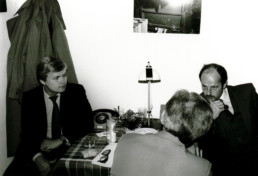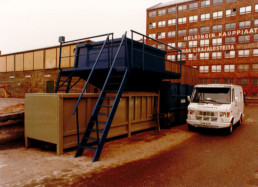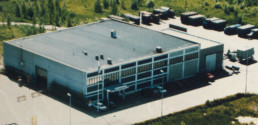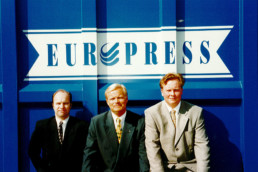History
Europress was founded in 1977 and its first factory began operations in 1984 in Pohja, Finland. Today, the modern Europress waste compactor and baler factory in Kerava produces more than 1000 premium-quality waste management devices each year for our customers around the world who value sustainability.
The first Europress waste compactor, the Europak 150, was sold for FIM 48,100 (approximately EUR 8000) to Finnish retailer Kesko and delivered to the address Päivärannantie 18 in Kuopio. The idea of compacting waste was still new at the time and there was little sorting of waste, but times have changed. These days, recyclable materials are sorted at the same address at both the K-Citymarket supermarket’s own waste point and at the Rinki eco take-back point for consumers.
Europress founded
The Europress story begins in 1977 when Matti Turunen, who is still CEO of the company, founded the company together with Markku Aalto. The two young men wanted to do their part to solve the problem of growing mountains of waste by beginning to sell waste compactors that could compress waste into a smaller size. They founded Europress on 9 December 1977, and the two ran the company by themselves for the first three years.
Initially, the products sold by Europress were manufactured by Finnish subcontractors. During the first year of operations, the company sold eight waste compactors. By the second year, the number almost doubled. The third year was the most critical, as the original target had been to achieve profitability by then. A total of 31 waste compactors were sold that year, operations were indeed profitable, and the company could begin growing in earnest.
Service operations right from the start
Ever since then, Europress has remained profitable every year with the exception of just one, 1995, which came after a severe economic depression in Finland. A lot of work had been done before then to ensure that the company could cope with challenges and continue to grow in the future. Already in 1980, the company introduced a leasing scheme that was a groundbreaking solution at the time. Service operations were also developed. Maintenance for Europress devices had been part of the original service package, initially on an outsourced basis and from the 1980s onwards with its own service department. At the start, two service technicians served customers throughout Finland. In this way, the company provided nationwide service already in its early days.
Own production introduced
In 1984, Europress expanded its operations by introducing its own production in Pohja, which already had suitable manufacturing facilities. After operating for ten years in Pohja, production had grown to such an extent that larger premises were needed. These were found in Hakkila in Vantaa, where production moved in 1994.
Over the years, Finnish production and high-quality design became trademarks of the company and a source of pride. The current factory was built in Huhtimo in Kerava in 2009. Special attention has been paid to developing a safe, functional and tidy work environment. The number of production employees has grown from seven at the first factory to around seventy today, and around twenty more employees now work in management and design.
Towards international markets
The company’s international expansion began already in the early 1990s, when its factory was still located in Pohja. Initially, Europress products were sold over the border through local partners, but by 2010, it had established its own sales and service companies in all its neighbouring markets. Since then, Europress has further expanded its markets in Europe and around the worldwide though both subsidiaries and partners.
Since the start of the new millennium, Europress has focused increasingly on pioneering technologies. In particular, it began developing smart technologies and using these as its primary competitive advantage.
In 2015, Europress received its largest single order to date for supplying waste compactors for use by Finnish consumers through the network of Rinki eco take-back points. The order for more than 400 waste compactors enabled the expansion of the factory in Kerava.
Europress celebrated its 45th anniversary in 2022. Today, developing smart waste management in the form of the Europress SMART system is at the heart of operations. Production capacity is being increased all the time to meet the needs of its expanding customer base. Among recent investments has been the installation of solar panels on the roof of the factory in 2021, which are able to cover 15 percent of electricity consumption.






